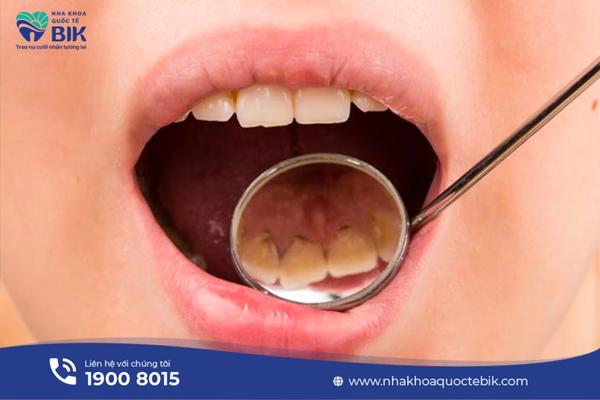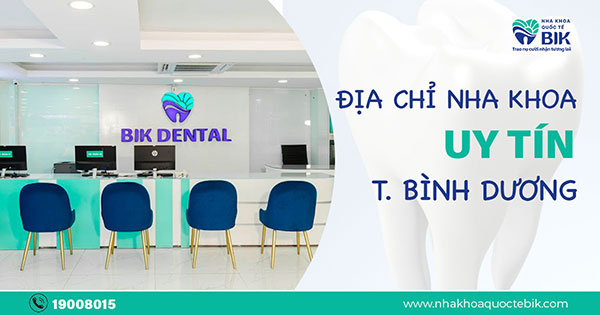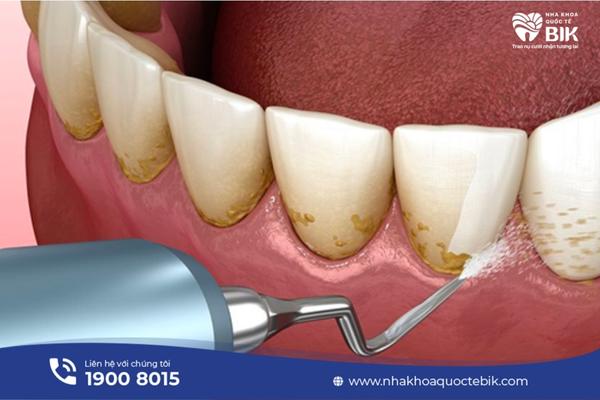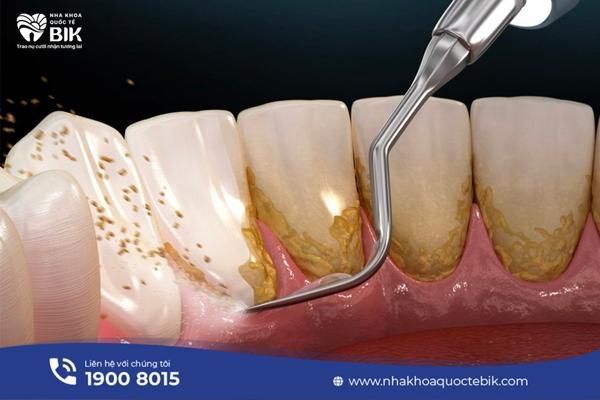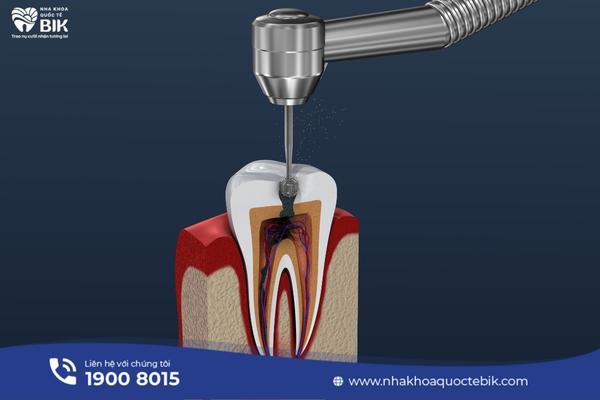Removing tartar is considered a measure to help overcome the yellow teeth that make you lose confidence when smiling as well as reduce the risk of other serious dental problems. Whether or not tartar removal is painful will largely depend on the doctor’s skills and the condition of the tartar, so choosing a reputable dental clinic to use the service is very important to have the most comfortable feeling when removing tartar.
1. What is dental scaling?
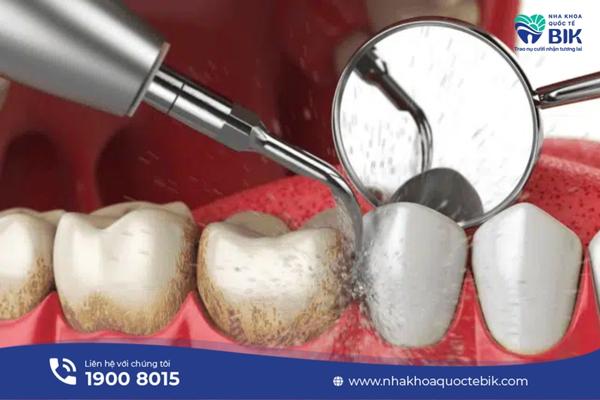
In fact, after a period of time after eating, if not cleaned, plaque will appear on the tooth surface. This plaque and food debris left between the teeth accumulate over time and will be calcified by bacteria, calcium carbonate salts and calcium phosphate in saliva to form tartar, also known as dental calculus. Tartar often accumulates in a thick, pale yellow layer that adheres firmly to the gum and tooth root.
Because tartar adheres very firmly to the tooth surface, professional scaling at the dentist is the only way to clean it. Scaling is the process in which the dentist uses a specialized tool to create vibrations to remove plaque from the gum and tooth body. This is a relatively basic and simple technique in dentistry but still requires precision and meticulousness from the dentist.
2. Harmful effects of tartar
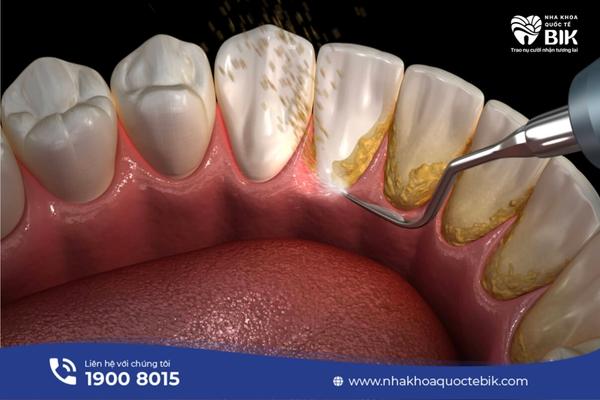
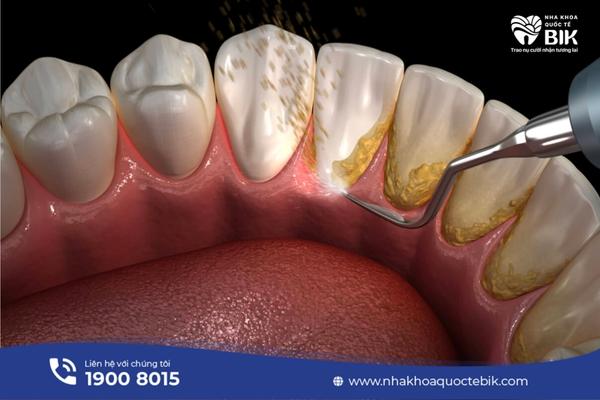
The harmful effects of tartar
Because tartar is a favorable environment for bacteria to grow and develop, it will bring many harmful effects such as:
2.1. Bone loss
Bacteria that accumulate for a long time in tartar produce many toxins that cause inflammation. If the inflammation is not treated promptly, it will lead to bone loss, causing the gums to lose their grip, the teeth will grow longer and longer, exposing the unprotected tooth roots. The more the tooth bone is resorbed, the shorter the length of the tooth root inside the bone, making the bone resorption process faster.
2.2. Leading to other oral diseases
Because it is located in a very favorable position to attack the gums and teeth, bacteria can easily attack these locations. The mildest condition that these bacteria can cause is gingivitis, tooth decay, and if gingivitis is not treated promptly, it will lead to periodontitis with symptoms such as: bleeding gums, toothache when eating and drinking
2.3. Causing loss of aesthetics

Because tartar forms in very visible locations but has a different color than the natural tooth color, it will make many people lose confidence when smiling.
2.4. Bad breath
Because bacteria hide under tartar to develop and wait for the opportunity to attack the gums and teeth, bad breath caused by one of these bacteria is inevitable. This unpleasant odor often cannot be eliminated by just basic daily oral hygiene steps.
3. Benefits of scaling
Due to the above harmful effects, scaling is very necessary and will bring benefits such as:
3.1. Eliminate bad breath

Because bacteria that cause bad breath develop in tartar, regular scaling will help eliminate bad breath. From there, just brushing your teeth every day will bring fresh breath all day long.
3.2. Preventing oral diseases
When plaque accumulates on teeth for a long time, bacteria will create acid that corrodes tooth enamel and this is the cause of tooth decay. On the other hand, bacteria can infect the gums below the gum line. If you have your teeth cleaned regularly, you will eliminate the risk of infection and gum disease.
3.3. Timely detection and treatment of oral diseases
When performing regular scaling, the doctor will have the opportunity to take X-rays to check the tooth roots and jawbone, at which time it is possible to detect oral diseases with signs that are difficult to see with the naked eye.
3.4. Improve health
Not only causing other oral diseases, bacteria in tartar are also the cause of health problems such as cardiovascular disease, throat disease, lower respiratory disease, etc. Therefore, removing tartar is also one of the effective methods to prevent the above problems.
4. Does scaling hurt?

With modern technology, dental clinics are equipped with ultrasonic scaling machines instead of traditional hook-based machines. The doctor will use the vibration of ultrasonic waves to make the tartar fall off the tooth surface, tooth neck and between teeth without affecting the enamel. Whether the scaling process causes much pain or not depends on the following factors:
4.1. Oral health
The condition of the tartar plaque will be the first factor that determines whether scaling is painful or not. In cases where tartar has accumulated into a thick layer and adhered tightly under the gums, scaling will cause some pain. However, this feeling will disappear after a few days and will not affect the chewing function of the teeth at all.
In addition, if the customer has diseases such as periodontitis, gingivitis, swollen gums, scaling will cause more pain because the tool still has to come into direct contact with the gums to remove tartar.
4.2. Dental scaling technique
Although scaling is a fairly simple technique, the dentist’s skills are also an important factor in reducing the customer’s pain. If the doctor is highly qualified and has many years of experience in the profession, he or she will perform the procedure gently and accurately, without affecting the tongue or inner cheek, thereby reducing the feeling of pain and sensitivity.
4.3. Supporting equipment
If in the past, doctors often used hand tools or sandblasters to remove tartar, with the development of modern technology, ultrasonic tartar scrapers are more popular. This is a technique of removing tartar with vibration at a moderate frequency, without affecting the enamel to avoid sensitivity but still ensuring maximum removal of tartar plaque.
5. Some notes when removing tartar
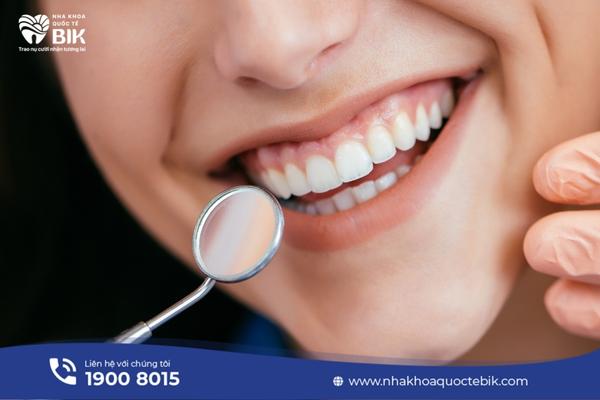
Although it is a fairly simple and popular technique, customers should still note the following to ensure the process of removing tartar is safe:
5.1. Children under 10 years old
Under 10 years old, children’s baby teeth are often not completely lost and permanent teeth are still in the formation stage. Therefore, scaling will cause the newly emerged teeth to grow crookedly. Therefore, at this age, children should only practice oral hygiene every day with a toothbrush or, if scaling is necessary, reduce the vibration intensity of the ultrasonic machine.
5.2. People with oral diseases
In case the customer is experiencing oral problems such as tooth decay, pulpitis, periodontitis, etc., scaling will cause pain and possibly bleeding because the teeth and mouth are damaged.
5.3. Pregnant women
Scaling during pregnancy is absolutely necessary, but pregnant women should only have their teeth scaled in the middle 3 months of pregnancy (months 4, 5 or 6), avoiding the first and last 3 months to ensure maximum safety for the health of mother and baby.
6. How often should you get your teeth cleaned?
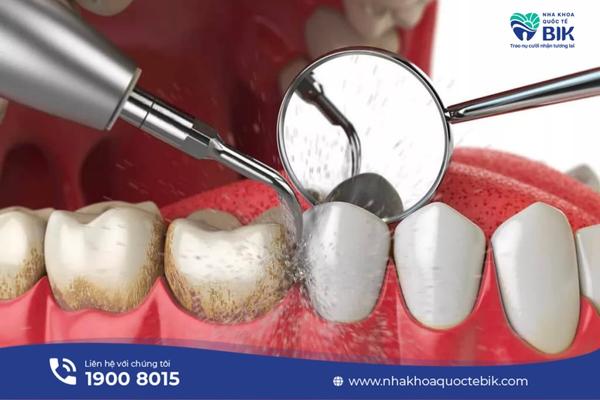
Because tartar accumulation over time can cause many dangers to oral health, scaling is extremely necessary and beneficial. However, regular scaling can cause bleeding gums and other damage. Therefore, customers should only have their teeth cleaned periodically, depending on each oral condition, the interval between scaling sessions is different.
Usually, doctors recommend scaling every 6 months for cases of good oral health and smooth enamel. This is the most appropriate time because at this time, tartar has not formed too much, making it difficult to remove tartar and tartar has not yet been able to affect the gums.
In case of teeth with rough enamel, easily accumulating leftover food particles, people who often drink tea, coffee or smoke should have their teeth cleaned every 3-4 months.
7. Oral care after scaling
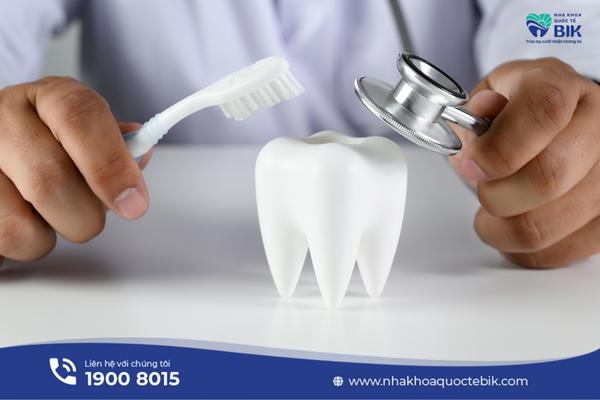
Because teeth and gums become very sensitive and vulnerable after scaling, it is important to pay attention to proper oral care:
7.1. Proper oral hygiene
Brush your teeth twice a day with dental floss and mouthwash to prevent plaque from forming. Be sure to use a soft-bristled toothbrush, apply moderate force, and avoid placing the toothbrush horizontally to avoid damaging the enamel. Use saline to rinse your mouth immediately after eating to remove any remaining food particles.
7.2. Foods to avoid
– Foods that are too hot or too cold to avoid damaging tooth enamel, causing tooth sensitivity
– Avoid dark-colored foods such as tea, coffee, chocolate, etc., as well as stay away from cigarettes, beer and alcohol after scaling
– Limit foods that contain a lot of sugar, are too hard or chewy, or chewy


